There is no shortage of opportunities in the bull market. Participating in early-stage emerging projects always seems to double your capital in a short period of time. Reports of 100-fold coins and 10,000-fold coins follow one after another, and the crypto community is greedily looking for the next password.
In the face of the 10,000-fold meme and AI concepts that have emerged, the increase seems to be just a number, and doubling is no longer enough to make waves in the encryption community. But among the popular tokens, ResearchCoin (RSC) has attracted the attention of the market, and its price has exceeded previous highs several times in the past month.
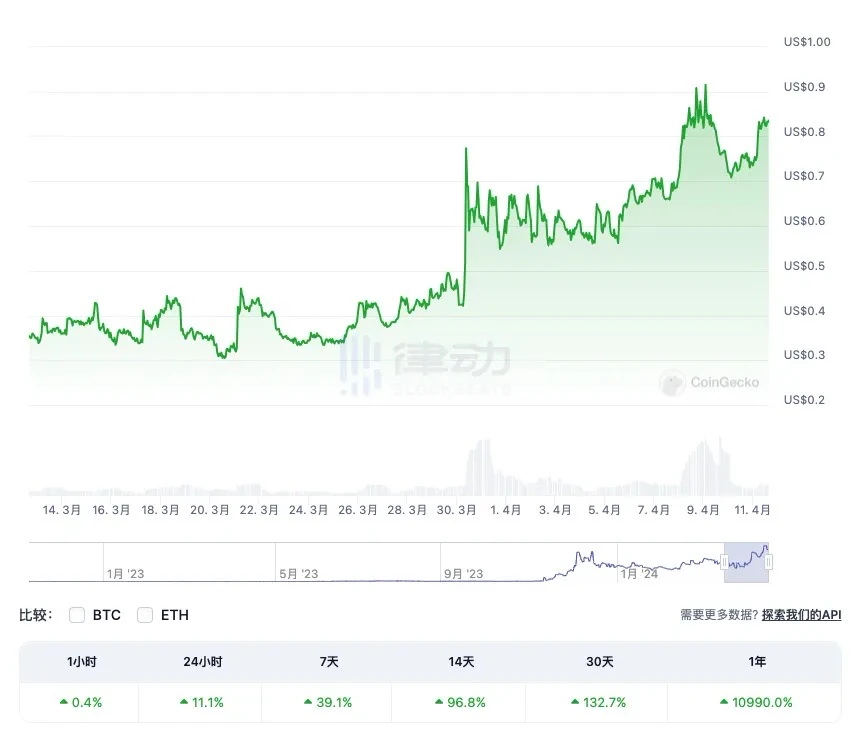
In addition to the increase, it is worth noting that the track to which RSC belongs - DeSci (Decentralized Science), which is decentralized science, is a project that uses Web3 (including NFT, smart contracts, DAO) by establishing public infrastructure Actions to achieve fair and equitable funding, creation, review, storage and dissemination of scientific knowledge. DeSci encourages scientists to share their research openly and receive credit, while allowing anyone to easily access and contribute to their research.
In the New Years outlook at the end of last year, many VCs publicly stated that they were optimistic about the DeSci track. For example, Messariinvestment forecastThe article turns its attention to several key non-financial sectors in the crypto space, with DeSci surrounding key solutions for our industry that extend well beyond the financial sector and are thus less driven by rampant hype.
Matti, co-founder of Zee Prime Capital, was interviewed by BlockBeatsinterviewShi said that DeSci is solving some real-world problems that have utility that most cryptocurrencies don’t have directly and are more like cryptocurrencies of cryptocurrencies.
However, for current cryptocurrencies, the popularity of DeSci is not high and it is still a very new concept.
Compared with the Chinese community, DeSci is discussed more in the English community. At the end of last year, Berlin held a DeSciMeeting, including Zee Prime Capital co-founder Matti, Molecule CEO Tyler Golato and co-founder Paul Kohlhaas, and many other industry OGs participated to express their research and understanding of Desci.
In the Chinese community, perhaps it was former Binance CEO CZ’s speech on the social platform that caused DeSci to create a small wave of craze. CZ said it had been reading about biotech and thinking about how crypto could be used to accelerate research funding there. As we all know, the encryption circle has been researching longevity for a long time, and DeSci perfectly meets the research needs in this field.
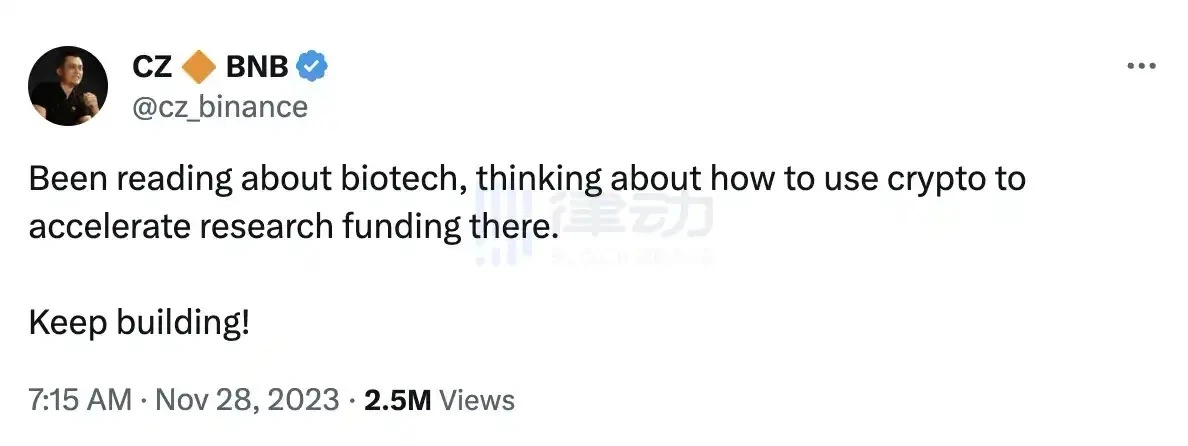
according toWIKI collected data, there are currently hundreds of projects on the DeSci track. But according to Messari report data, 50% of DeSci projects were established within the past year. As can be seen from the figure, in the current ecological landscape of DeSci, DAO is the most prosperous, while other combination concepts such as NFT are still in a relatively early stage.
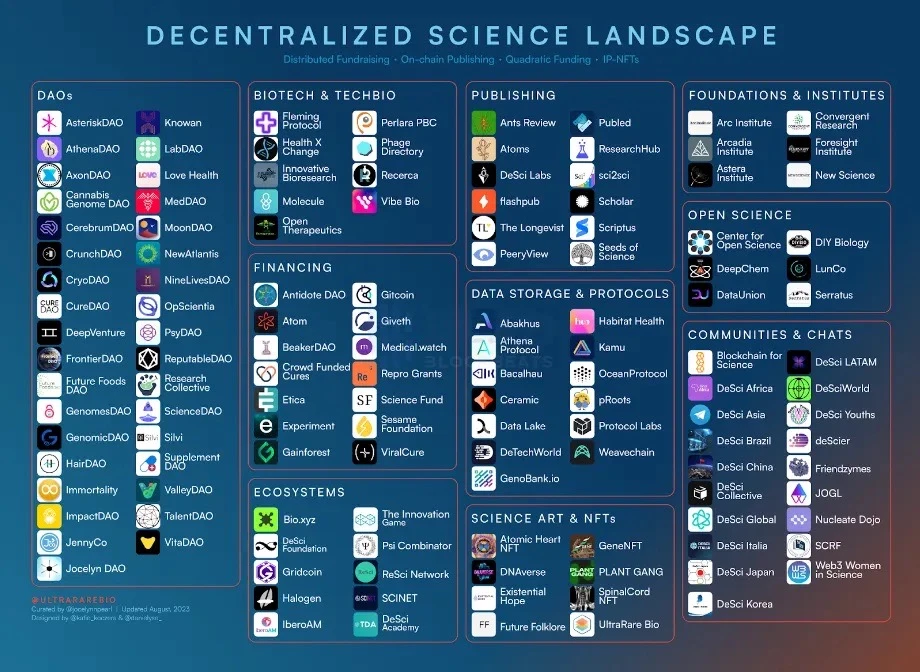
DAO solves DeSci financing problem
DAO can be said to be the basic form of existence of the DeSci concept. In the current ecological landscape of DeSci, DAO is the most prosperous. At present, the biggest and most important problem that DeSci needs to face is the difficulty of financing. In addition to DAO, it can be seen that the sector focusing on decentralized financing also accounts for a large part of the entire track, and the most important purpose of the existence of DAO is In order to solve the financing problem.
Traditional scientific research seeks scientific research funding and resources through centralized methods such as the National Natural Science Foundation of China, but this will lead to a lot of problems in the scientific research method during the funding application process, and the entire process of applying for funding will be lengthy and inefficient. Furthermore, due to the deterioration of the general environment, such as economic deterioration and environmental protection reasons, the overall scientific research funding has gradually decreased, and the scientific research funding problem has become increasingly serious.
The interconnected Desci ecosystem
In Descis ecosystem, the close connection between projects may be a good start. Raising financing in the form of DAO seems to be a good choice, and different DAOs will also invest in each other.
For example, after receiving investment from Seed Club Ventures, Molecule participated in LabDAO, an open source drug research and development organization. Subsequently, Molecule also received another $1 million investment from Sora Ventures. To promote innovation in biomedical research, Molecule will provide funding exclusively to researchers in Asia, with plans to award US$50,000 to deserving scientific teams or individuals.
As a biotechnology research fundraising platform built on Ethereum, Molecule has two main systems: Molecule Discovery and Molecule Finance. Molecule uses a combination of smart contracts and legal contracts to form intellectual property NFTs (IP-NFTs). This new mechanism allows anyone to share the ownership of research projects and their future results, such as intellectual property rights, royalties, data, etc.
Molecule CEO and co-founder Tyler Golato and co-founder Paul Kohlhaas co-founded Bio.xyz and VitaDAO.
Bio.xyz, as a biotech DAO accelerator and DeSci meta-governance layer, aims to enable DeSci DAO to leverage IP-NFT to fund, manage and develop the intellectual property of universities, companies and researchers around the world. Not only that, Bio.xyz also provides DeSci DAO with a launchpad, resources, guidance, a shared network, and a set of legal and smart contracts.
Molecule and bio.xyzs fundraising targets decentralized scientific organizations similar to VitaDAO. Grouping multiple projects together could make it easier to apply for scientific research grants and link intellectual property to cryptocurrencies.
DAO focuses on real-world problems
According to OP ResearchResearch, among the current DeSci projects, the most people tend to focus on the biology track. This may be due to the large number of biological research directions and the increase in the general publics attention to biological sciences due to the epidemic.
VitaDAO is a leader in research and development in the field of longevity. As the worlds first biotechnology DAO, VitaDAOs main goal is to promote the progress of longevity research and extend human lifespan and health span. Its native token VITA rose 48% on the 30th, with a market value of US$83.29 million. VITA holders participate in VitaDAOs decision-making process, including project funding selection, fund management and governance activities.
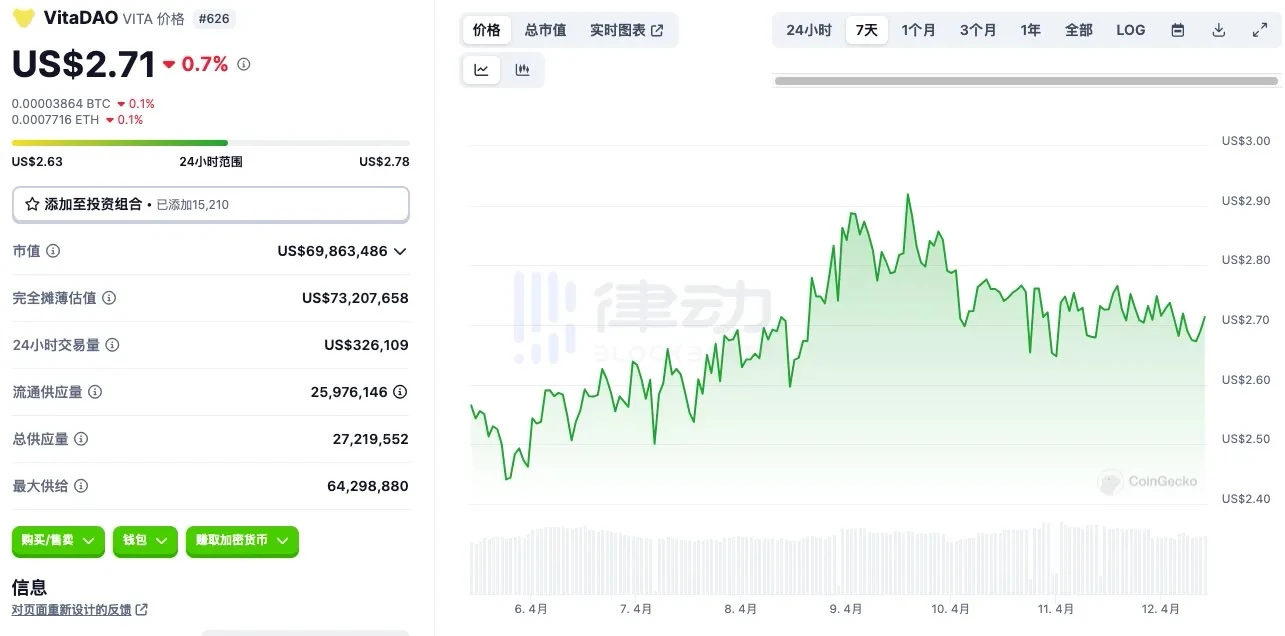
The AxonDAO Governance Token (AXGT) also focuses on biotechnology. It redefines the interaction between individuals and their health data through the power of blockchain technology and artificial intelligence. The foundation of the project is built on the use of precognitive algorithms, drawing on biometrics, genomic data and other key health indicators to not only monitor but predict health outcomes.
Desci can use AxonDAO to provide a solution that simplifies the collection, storage and verification of clinical data through blockchain technology. This approach ensures secure and transparent data processing while also enabling the establishment of common standards for the decentralization of personal health and wellness information, thereby promoting easier access and greater control for individuals over their own data.
In the field of biotechnology, there is another popular topic: hair loss. HairDAO is a decentralized organization dedicated to treating hair loss and adopts an open source investment and operation model. Through HairDAO, patients and researchers collaborate to develop revolutionary new treatments for hair loss. Users treatment experiences are recorded in HairDAOs application and HAIR tokens are earned as rewards.
HairDAO has rich reward mechanisms, cultural features, Meme temperament and other characteristics. According to Zee Prime Capital co-founder Matti’s article “hair is money”, HairDAO’s end state is a fully vertically integrated pharmaceutical business, including drug manufacturing and distribution. HairDAO had to transform from a chaotic Discord group of only a thousand people into a reliable enterprise that could both house tens or hundreds of thousands (for data collection) and outsource physical world operations (for approvals, patents, manufacturing, distribution, etc.).
Desci solves peer review and moderation challenges
On the basis of funding, the second biggest problem Desci faces is the pain point of peer review publication and paper review. Under normal circumstances, for a certain scientific research project, the funding cycle often starts from the beginning of the year when the application is written, and is completed and reviewed at the end of the year. A large amount of time is spent on the application procedures and assessment process.
In the assessment and approval process, scientific research projects lack a comprehensive and efficient approval mechanism. Often when a project applies for scientific research funds, the progress is already more than half, and it is difficult for scientific research funds to be allocated to the areas where scientific research is most needed. In addition, in the current review of scientific research funds, the publication of journal articles and patents is an important reference point for the review of scientific research funds. Based on this, the publication of journal articles and patents has become a rigid need, and some scientific research magazines have even explicitly priced themselves to form an industry chain. This single And the unreasonable review mechanism has led to the gradual utilitarianization of journal articles and deviated from the original intention of scientific research direction.
ResearchCoin (RSC) mentioned at the beginning decentralizes the right to review and speak out in a decentralized manner, aiming to change the traditional publishing model of scientific research journals.
By creating a Hub system that replaces traditional journals, ResearchCoin allows scientists or scholars to publicly publish and discuss scientific or academic content directly in these centers, thereby avoiding the review process of traditional publishing, accelerating the dissemination of information, and conducting post-publication Peer review. As a crypto-research platform, users earn ResearchCoin (RSC) by publishing content to ResearchHub, and the number of RSC received is proportional to the value of the content deemed by other members of the community.
Additionally, users can set RSC bounties for peer review, paper abstracts, or new methods in the lab. Research can also be funded by “pre-registering” projects, raising cryptocurrencies in forum posts before research work begins. According to ResearchHub, activity on the platform continues to grow over time, with peer review activities in particular being the most active and promising.
ResearchCoin was co-founded by Coinbase CEO Brian Armstrong and others, and completed a $5 million Series A round of financing on June 15 last year. According to coincko data, as of writing, the price of RSC rose to $0.8328, a 24-hour increase of 10.3%.
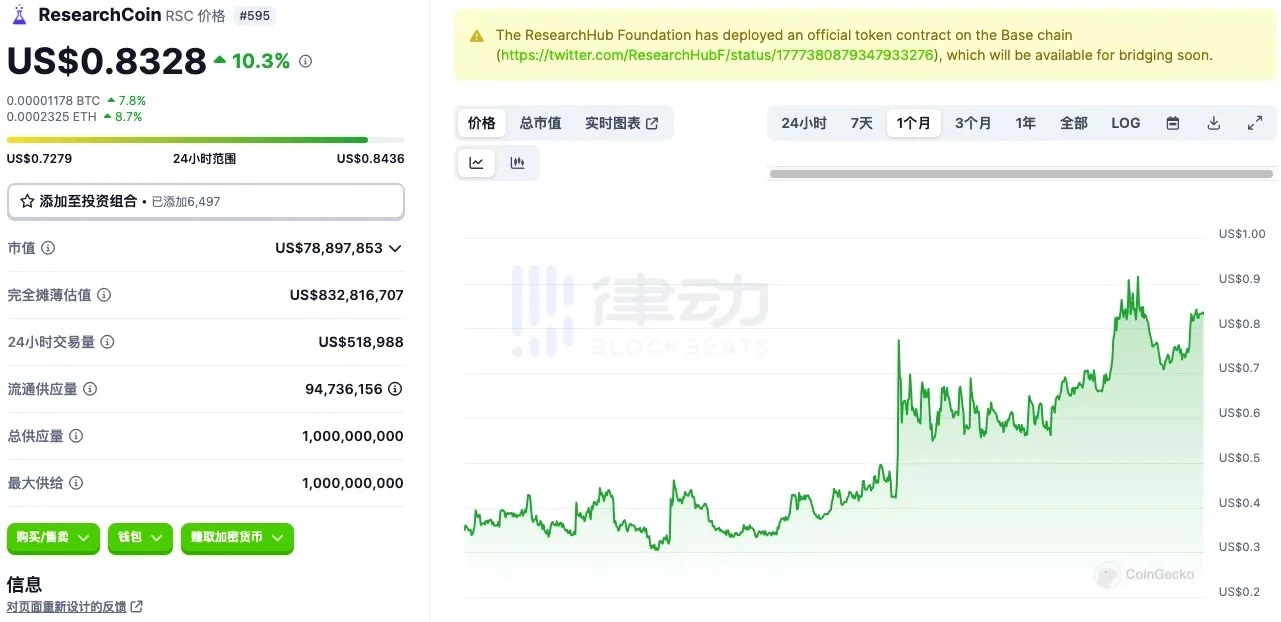
Although most tokens in the DeSci field have achieved good growth, perhaps due to the low popularity of this concept, in the DeSci market capitalization rankings compiled by Coingecko, some of the official social media introductions of the top projects are marked with DePIN, RWA and other labels.
For example, OriginTrail, whose total market capitalization ranks 201st among the total crypto market capitalization, is also the No. 1 project on this track, while the official Twitter tags of OriginTrail only show AI, DePIN, and RWA. According to its official website, life sciences and medical care are key research directions for this project. Dynex, the sixth-ranked project on this track, cannot directly see DeSci-related content through its official website and Twitter. As a neuromorphic quantum computing cloud, Dynex only mentions DeSci-related use cases in its document introduction, including pharmacy, automobiles, Aerospace, etc.
As an emerging concept, the DeSci track may become increasingly popular in the same way that other very small projects are gaining traction.










